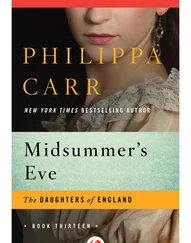I loved the harbor with the little fishing boats swaying on the tide, secured as they were to the great iron rings which made you watch your step as you ran along. I liked to stand by and watch the men as they worked.
“Good day to ’ee, Miss Angel,” they would call.
Angel. It was so incongruous. It was Angelet really. My mother was very interested in the family and she told me of an ancestress who had lived during the time of the Civil War. Her name had been Angelet and I was named after her. I am afraid the diminutive form did not exactly suit me. Perhaps people used it to try to make me live up to it.
They all knew who I was, “ ’er from Cador, Miss Angel who might have inherited the place but for Mr. Jack.” I could imagine their conversation when he was born. “Well, it be right and proper for a lad to be the master. ’Tis no place for a maid.”
I knew them so well, these people around me. I sometimes knew what they were going to say before they said it. Old Mrs. Fenny with her prying eyes, scenting out secrets; the Misses Poldrew who lived in a little house on the edge of East Poldorey which was as neat as they were. I knew they looked under their beds every night to see if a man was hiding there, so eager were they to guard their virtue which nobody so far had shown any inclination to assail. There was Tom Fish who was always about with his wheelbarrow when the catch came in; he trundled it through the two towns and up and down into the nearby villages calling “Fish, fresh from the sea this morning. Come, women. Tom Fish be at your door. I’m here, me darlings.” There was Miss Grant who kept the wool shop and sat by her counter crocheting as she waited for customers; there were the bakers with the enticing smell of hot bread and Pengelly’s who sold everything from thimbles to farm implements; and there was the Fisherman’s Rest where the men went after they had disposed of their catch, mingling with the mining community. “Throwing away all that they snatched from the sea or grubbed from the land,” Mrs. Fenny would comment sitting at her window watching them reel out of the inn. “Old Pennyleg ought to know better than serve ’em,” was her comment. She had resigned old Pennyleg, the innkeeper, to the flames of hell long ago.
I was very interested in Mrs. Fenny. I liked to see her sitting with her Bible on her lap tracing the lines with her finger and moving her lips. I wondered why she did this for I knew she could not read.
I loved to sit on a pile of rope with its tang of seaweed and listen to the waves while I looked out to sea and I would think of the men who had gone off into the unknown to explore the world … men like Drake and Raleigh. I would imagine the sails fluttering in the breeze and the bare-footed sailors running hither and thither while I strode the sloping decks, shouting orders. I imagined Spanish galleons, full of treasure; sending out raiding parties, bringing them in and taking the treasure back to England. I was constantly losing myself in daydreams. I was often Raleigh or Drake. Those dreams were difficult because I had to change my sex; but there were others in which I indulged with even greater frequency. I would be Good Queen Bess knighting these men. That was better. I could see myself very well as the great Queen. Three thousand dresses and a red wig and power … glorious power. Sometimes I was Mary Queen of Scots, going to her execution. I made touching speeches on the scaffold and there was not a dry eye near me. The executioner was so touched that he refused to cut off my head. One of my ladies, who worshiped me, insisted on taking my place. We tried to stop her but she insisted. And then … I pretended to be her … until some gallant man came and rescued me. We lived in happy security to a great age and no one ever discovered that I was the Queen because everyone thought I had been executed in Fotheringay Castle.
Such dreams were more real to me than what was happening about me. This was before that terrible time in St Branok Pool. After that I changed. I dared not indulge in daydreams then in case they led me back to the pool.
Cador was about a quarter of a mile out of the two towns of Poldorey. We were on a hill looking out to sea. It was very splendid with its towers and turrets and its gray stone walls which had stood against the sea and the weather for hundreds of years—a fortress if ever there was one. One could lie in bed at night and listen to the wind playing about those stone walls—sometimes shrieking like a madman, sometimes whining like an animal in distress; sometimes shrill, sometimes melancholy. It had always fascinated me before that encounter; after that I hated the sound of the wind. It was like a warning.
There was a richness about life in those days. I was vitally interested in everything about me. “Miss Angel’s nose b’ain’t what you’d call a big ’un,” was Mrs. Penlock’s verdict, “but it be into everything.”
I loved the little cottages with their whitewashed cob walls all huddled together on the quay. If ever I had a chance to get inside I seized it. I would go visiting with my mother at Christmas when we took gifts to the cottage folk in accordance with the custom of years. Those homes of the poor consisted of two dark rooms divided by a partition not as high as the roof which I understood was to allow the air to circulate. Some of the cottages had a talfat, a sort of shelf close to the ceiling, and here the young would sleep, climbing up by means of a rope ladder. The only light was what they called the Stonen Chill— an earthenware lamp in the shape of a candlestick having a socket in which they would pour oil before inserting the purvan, the local name for the wick.
The woman of the house would dust a chair for my mother to sit on, and I would stand beside her, eyes wide, noting everything and listening to the talk about how our Jenny was getting on as maid up at the rectory or when our Jim was expected home from sea. My mother knew their business. It was part of the duties of the lady of the big house.
There was always a smell of food in the cottages. They kept the fires going with the wood they picked up from the beach. I loved the blue flames which they said was due to the salt in the wood and betrayed the fact that it had been salvaged from the sea. Most of them had cloam ovens in which they did their baking, while a kettle, black with soot, hung on a chain over the flames.
They had a different language from ours, I often thought, but I learned it. They ate different foods such as quillet which was a mixture of ground peas rather like a porridge and there was pillas, a kind of oatmeal which they boiled into a mixture called gurts. My mother told me that in the last century when these people were very poor they used to pick the grass and roll it in a pastry made of barley and bake it under the ashes.
They were more prosperous now. My mother frequently pointed out to me that my father was a good man who looked on it as his duty to see that no one in his neighborhood should starve.
The poor fishermen depended so much on the weather, and the winds on our coast could be violent. A certain melancholy descended on the Poldoreys when the knowledgeable predicted fierce winds and storms which would keep the boats idle. Of course, sometimes these appeared without warning and that was what fishermen and their families dreaded most. I heard one fisherman’s wife say: “He do go out and I never knows as whether he’ll be coming back.” I thought that was very sad. It was the reason why they were so superstitious. They certainly looked all the time for signs and portents—mostly evil ones.
The members of the mining community were the same. The moor began about two miles from the town and close to the moor was Poldorey’s tin mine. It was affectionately known as the old “Scat Bal” which meant useless, worked-out old has-been. It was far from that for it had brought prosperity to the community. We were on visiting terms with the Pencarrons who lived in a pleasant house close by, called Pencarron Manor. They had come to the district some years ago, bought the place and started working the mine.
Читать дальше












